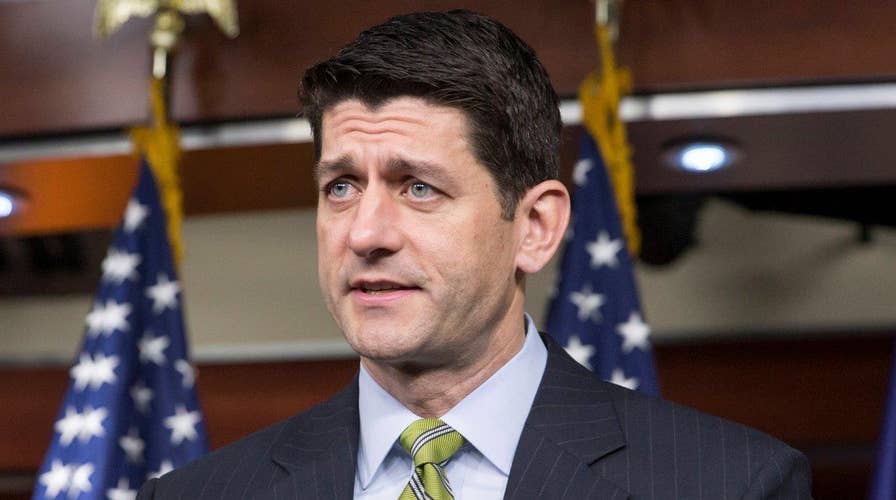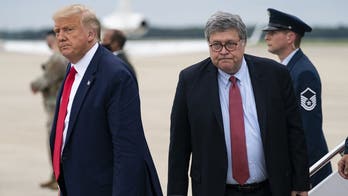House Speaker Ryan admits contested convention more likely
James Rosen reports from Washington, D.C.
“The wand chooses the wizard, Mr. Potter. It’s not always clear why” -- Wand merchant Mr. Ollivander in “Harry Potter and the Philosopher’s Stone”
All GOP House Speaker Paul Ryan wanted to do was lead the chamber’s Ways and Means Committee -- toil over the minutia of tax policy including inversions, corporate tax rate and arcane provisions in international trade agreements.
But the universe often stores very different plans for all of us, drafting us for roles we didn’t pursue.
Former House Majority Leader Eric Cantor, R-Va., was supposed to succeed then-House Speaker John Boehner, R-Ohio.
And then Cantor unexpectedly lost his June, 2014 primary to fellow Virginia Republican Dave Brat.
Then, House Majority Leader Kevin McCarthy, R-Calif., was in line to run the place once Boehner moved along.
His bid for speaker imploded spectacularly.
And so after weeks of pandemonium and a strong lobbying effort, the House elected Ryan as speaker last October, though Ryan initially had no interest in the opportunity and resisted entreaties to clasp the speaker’s gavel.
Ryan’s has only served as speaker a short time. Yet an adjunct assignment attached to Ryan’s day job could very well etch his legacy in American political history.
The speaker’s position entails a moonlighting gig as chairman of the 2016 Republican Convention. And that convocation, in Cleveland, could prove to be the most-rambunctious American political event in decades.
Ryan said repeatedly he didn’t learn that the speaker leads the convention until “a week” after he assumed his current assignment.
So much for reading the fine print …
Boehner presided over the GOP convention in 2012 and as House minority leader in 2008.
Former House Speaker Dennis Hastert, R-Ill., chaired Republican conventions in 2000 and 2004. Former House Speaker Newt Gingrich, R-Ga., led Republicans at their 1984, 1988 and 1992 assemblies.
Upon seizing the speaker’s gavel, Ryan thought his biggest challenge would be handling the fractious House Freedom Caucus, approving a budget or eventually reforming the tax code.
But the Cleveland convention could metastasize into an inferno. And it will fall to Ryan to spray foam on the embers to keep it from erupting.
“I think you’d have riots,” said GOP presidential frontrunner Donald Trump when asked if the nominating process devolves into a contested convention.
Ryan’s already called out Trump for his comments on immigration, Muslims and appearing to disavow white supremacist David Duke.
Ryan said he did “not believe” the furor would hit such a volume that he’d have to disavow Trump. But this week, the speaker chastened the GOP frontrunner yet again.
“Nobody should say such things,” said Ryan when asked about Trump’s civil unrest prediction. “To even address or hint (about) violence is unacceptable.”
So it falls to Ryan to keep order. Entertain and rule on parliamentary appeals. Consider amendment proposals governing the rules on the floor. Wrestle with delegate allocations. Perhaps the biggest challenge for Ryan will be to address such a potentially raucous scene in an unflappable manner that appears non-partisan and fair, even though various wings of the party may have daggers out for the speaker regardless what happens.
At a February 25 press conference, Ryan indicated he wanted to stay above the fray and not get embroiled in the melee. NBC’s Luke Russert asked if Ryan was studying Republican convention rules in anticipation of possible floor fights.
“I have not versed myself in it,” said the Wisconsin Republican. “I see this as more of a ceremonial role.”
But this week, Ryan changed that tune.
“I will obviously bone up on all the rules,” Ryan said. “My goal is to be dispassionate and to be ‘Switzerland.’ To be neutral and dispassionate. Make sure that the rule of law prevails and to make sure that the delegates make their decision however the rules require them to do that. I will acquaint myself with these things at the right time.”
Why the change?
“(There is) the perception that this is more likely to be an open convention that we thought before,” Ryan replied. “We’re getting our minds around the idea that (a contested convention) could very well become a reality. Therefore those of us who are involved in the convention need to respect that.”
At the convention, Ryan’s in charge of gaveling the sessions in and out.
Ryan would preside during the roll call for the presidential and vice presidential nominees. He’ll sign nominating documents. And the speaker must make decisions if key party leaders or delegations attempt to challenge rules, nominations or who’s seated. You name it.
Political conventions long ago shed their status as crucibles of democracy.
They’re now glorified, boozy trade shows. Capitol Hill interns and junior aides treat sneaking into convention parties and rock concerts as sport. There are fancy dinners. Certainly carousing. But the Cleveland convention could be a lot different.
There was disquiet as recently as the 2012 Republican convention in Tampa.
Presiding over the 2012 forum, John Boehner ignored howls from Texas delegates when they tried to challenge two rule changes.
Delegates argued the alterations harmed then-GOP presidential candidate Texas Rep. Ron Paul. Paul backers protested and demanded a revote as Boehner gaveled the rules package to passage via a voice vote. However, the din practically made it impossible for Boehner to judge whether the yeas or nays were louder.
A commotion then ensued on the floor with delegates chanting “point or order,” begging for recognition from Boehner.
Boehner turned and left the stage.
At another point, RNC Chairman Reince Priebus gaveled down an uprising from the Maine delegation. The party discovered an issue with the selection of delegates. Maine Republicans -- many of whom were committed to Paul -- weren’t seated at the convention.
They then rebelled, chanting “Seat Maine Now!”
There were threats of a floor fight. Some conventioneers described the process as “a railroad.”
Such an unscripted moment hadn’t unfolded at a political convention in years. One wonders how much “script” there will be in Cleveland. In a combustible political atmosphere like this, there will be trouble if the convention chairman and others make autocratic decisions and shut people out.
A rhubarb in Cleveland could very well make Ryan wish he was simply back on Capitol Hill, managing House affairs.
However, in this political cycle, the role of the speaker of the House could be problematic back in Washington, too.
Article II, Section 1, Clause 3 of the Constitution and the 12th Amendment set the ground rules for settling disputes in the Electoral College when selecting the president. The race for president is pitched into the House of Representatives if there’s a deadlock in the Electoral College with no candidate securing a majority of electoral votes.
Only twice has the House picked a president in a “contingent” election: 1800 and 1824.
Thomas Jefferson and John Quincy Adams were the beneficiaries of the House’s action, becoming president. In 1824, Andrew Jackson won the popular vote and the most Electoral College votes in the general election.
But Jackson didn’t earn a clear majority in the college among four major candidates. One of the candidates was House Speaker Henry Clay of Kentucky, who placed fourth.
Clay was clearly in charge when it came to the House.
Under the 12th Amendment, members of the House vote not as individuals but as state delegations. The candidate who secures the most state delegations becomes president.
It was argued that Clay engineered a pact to convince the state delegations to elect Adams over Jackson.
Adams then selected Clay to be secretary of State. Jackson found the entire scene revolting. He denounced Clay for orchestrating a “corrupt bargain” for the presidency.
Jackson then launched a four-year campaign aimed at taking out Adams. Jackson extracted his revenge in 1828, defeating Adams and becoming the first, true “outsider” president.
Sometimes House elections for president take a while. In the 1800 presidential race, Thomas Jefferson and Aaron Burr tied with 73 electoral votes. The sitting president, John Adams, garnered 65 electoral votes.
The House -- meeting in what is now the office of Senate Majority Leader Mitch McConnell, R-Ky., in the Capitol -- voted for eight days to select a president. Jefferson finally defeated Burr on the 36th ballot. Then, in a bizarre twist, the House tapped Burr as Jefferson’s vice president.
Think tensions were high? Jefferson picked Alexander Hamilton to be his treasury Secretary. Burr later shot and killed Hamilton in their famous duel.
Consider that for a minute:
The vice president of the United States -- who almost became president of the United States -- shot and killed the Treasury secretary of the man who defeated him in the House election to determine who was president.
Who knows how this election will wind up. But Paul Ryan could sure have his hands full at the convention. Things usually disintegrate further if the election goes to the House of Representatives.
There was a lot of chatter about Ryan running for president this cycle.
As recently as Wednesday, Boehner advocated Republicans pick Ryan as its nominee if the party can’t conclude things on the first ballot in Cleveland.
“Let’s just put this thing to rest and move on,” said Ryan on Thursday. “I saw Boehner last night and I told him to knock it off.”
It’s unknown if Ryan will ever run for president let alone become president. But one thing is clear: the speaker has a major role to play in the process. These are things Ryan didn’t necessarily sign up for when he became speaker of the House.
Remember, this is the guy who just wanted to chair the Ways and Means Committee.
But, the wand chooses the wizard.





